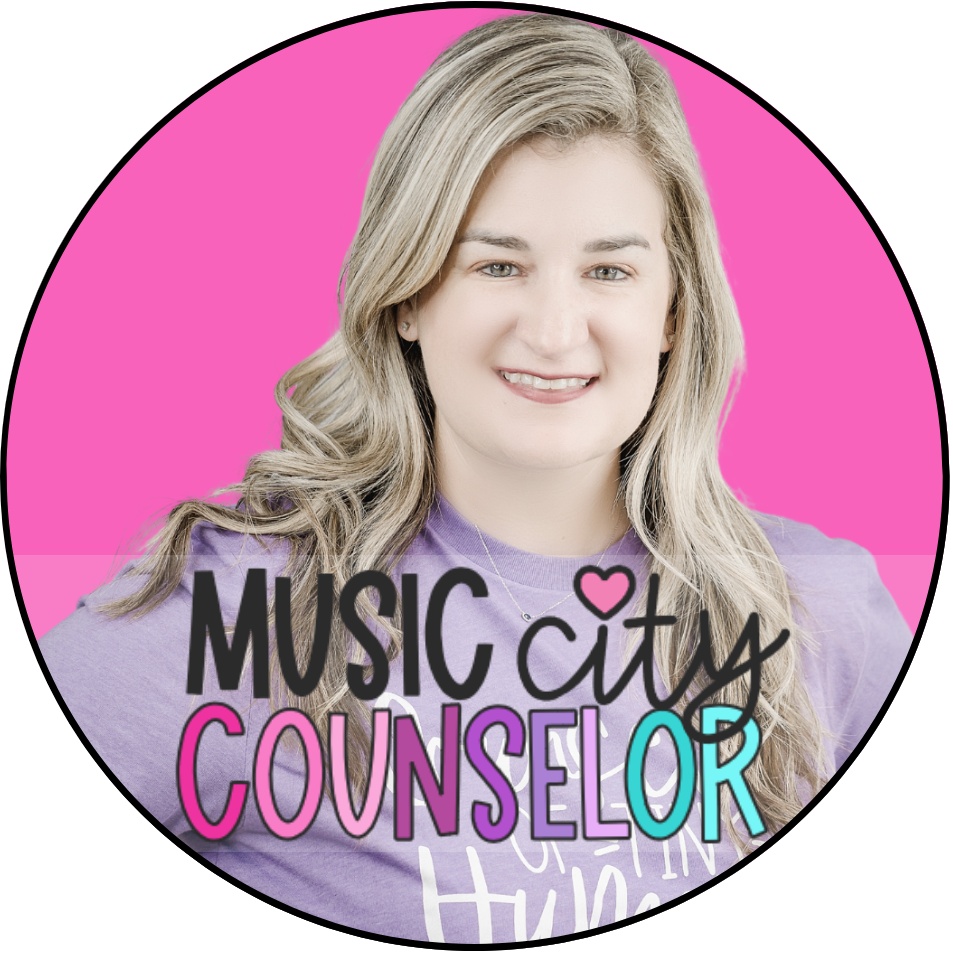
Hey y’all! Thanks so much for stopping by. My name is Laura and I am an Elementary School Counselor turned Curriculum Writer. At my precious school in Nashville, TN, 97% of my students were living in …

Can advocating for our role as school counselors be scary, tedious, and a bit overwhelming? Can it be done – and is it worth it? Yes, and YES! In my last post, I shared my four-step process for removing inappropriate duties from our plate, making way for programming and services that best meet the needs of our students and stakeholders. In this post, I share success stories from practicing school counselors to inspire and empower you to do the same. You’ll hear from:
“We are fortunate to have 13 school counselors across our district. During the 2019-2020 school year, we purchased SCUTA. The four elementary counselors gained access and began utilizing the program during the second semester. In early March 2020, in the midst of state testing and 504 preparation, I reached out to the Assistant Superintendent (our former building principal). I used my voice to advocate for our department and profession. I expressed concerns with the tremendous amount of time spent on non-school counseling duties. She had some ideas that might help to alleviate some of this burden. A few short weeks later, schools closed due to COVID and this conversation was paused. At that time, our SCUTA data was limited as well. I knew that we would revisit this conversation at a later point.
We returned to in-person learning for the 2020-2021 school year and consistently used SCUTA throughout the entire school year as a counseling department. I followed up with the Assistant Superintendent and Director of Pupil Services and Well-Being in April 2021 to revisit the conversation and concerns from the previous year. I attached a few of my SCUTA reports as well. They both agreed that the bigger discussion is around the topic of what is and is not appropriate for a school counselor. We had actually collaborated and started a document years ago that demonstrated which roles align and do not align with the ASCA recommendations. The Director assured us that even though we had to hit the pause button on some of this work, it was not forgotten. They would begin to look at how to best utilize our staff to meet the increased needs of students in our recovery plan and this topic would be a good place to start. Meanwhile, the other three elementary counselors shared their SCUTA reports as well, which included a use of time analysis (percent of time and number of hours) for the following categories: direct student services, indirect student services, program defining, managing and assessing, and non-school counseling. The amount of time spent on non-school counseling duties, particularly testing and 504 plans, was staggering and provided some solid data. School counselors across our district have been 504 building coordinators for years.
The elementary counselors were asked to provide a detailed list of all district and state testing responsibilities to provide to the administration, which continues to be an ongoing discussion. All of our district’s counselors were then asked to pull together SCUTA data specific to 504 plans. Two school counselors and our Director of Special Education Services presented to the Board of Education in early May 2021. The Board presentation covered some of the following 504 topics: district’s obligation under Section 504, eligibility, IDEA vs Section 504, steps in the Section 504 process, issues and conflicts with counselors fulfilling the 504 coordinator role, district’s 504 growth/trend data, SCUTA data (use of time data), violations of Section 504, dispute resolution options, and possible solutions.
At the end of May 2021, our district’s superintendent shared some exciting news! At the Board of Education meeting, they would be recommending that we hire an Assistant Director of Student Services and Well-Being. One primary focus of this position would be to serve as the district’s 504 Coordinator. I am excited to share that our collaborative efforts, consistent voices, advocacy, and SCUTA data led to the approval and hiring of a district 504 Coordinator. The hope is that this position will ease the burden placed on counselors and school leaders. It would also provide continuity across the school district in 504 approaches.”
* You can hear more from Nikki on social media and TpT: The Charismatic Counselor
“When I was hired as an elementary school counselor, I was told that I would be our school’s testing coordinator. According to the ASCA recommendations, I should be spending 80% of my time providing direct service to students. However, I started tracking my time, and found that during peak testing season (from March – May), I was spending only 20% of my time in direct service with students. It took two years of data collection, but I finally successfully advocated to be removed from the role of testing coordinator. I tracked my time each month, and broke it down into direct service and indirect service. I tallied up the percentages and put them in a pie chart. This was then sent to the superintendent of schools, where he saw that my direct service time was being compromised in those months of testing. It was well worth the wait and effort, because upon seeing this data, my superintendent relieved me of test coordination!”
“My first year as a school counselor was horrendous. I was on a special’s rotation, required to run small groups, MTSS chair, testing coordinator, and “wizard” among other things. Of course, I attempted all these tasks with a smile, but it was extremely difficult to juggle. My planning time and parent follow ups were always after school hours. It wasn’t until after three years with these responsibilities, I decided to build up the confidence to become completely transparent with my administrator.
At my summative evaluation (EOY eval), I was praised for many things such as engaging lesson plans, ethical practices, and fostering an empathetic school culture. It wasn’t until I was asked to add ANOTHER task to my plate that I laid it all on the table. I said, “There is no way I can be everything for everybody…I already feel that I skim the surface and nothing I do is of substance”. My administrator was FLOORED!!! “It’s as if you’re punished for doing a good job, even if you view your work as mediocre”. I provided my administrator with indirect and direct data and gave her specific names of students that I attempted to reach, but couldn’t because of testing trainings, curriculum meetings, 20 classes a week and so on. There was no way to fill the gap our students were slipping through.
She had no idea I felt this way and immediately asked what my ideal vision would be as a school counselor. I was prepared with ideas to decrease my class schedule, have a co-chair for MTSS, and thankfully the state of NC prohibited counselors to serve as testing coordinator the following year. As of today, our school has merged with another elementary school. I teach SEL for K-2nd grade and my co-counselor teaches 3rd-5th. Our curriculum facilitators coordinate MTSS and I chair 504. I run a girl’s leadership group and have plenty of time for my other direct and indirect tasks. It is finally My Dream Job!!! This wouldn’t have happened unless I ADVOCATED for my counseling program and of course my students!!!”
“As a school counselor, test coordination can quickly overtake your day (or even month!) When I first started school counseling, each counselor at my high school was in charge of one test (i.e. AP exams, PSAT, end-of-course, and state-level tests). This really took us away from our actual counseling responsibilities for about a month at a time. It was easy to see that students on each counselors’ caseload weren’t being served well during the time they were pulled to test.
Transitioning a “non-counselor” to the role of testing coordinator did not happen overnight. It was a slow process of gaining our principal’s trust, proving our effectiveness using data, and tracking our time. When we brought our principal the idea of applying for RAMP, he asked what we needed from him to make it happen. He was very motivated to win a very prestigious award that no other high school in our district had ever received. Our only ask was that testing be taken off of our plate. That ask from us, coupled with a push from our district to assign someone else to testing, gave us the tiny step in the right direction that we needed.
Our school counseling team started meeting monthly to get our application together for RAMP. Without testing, we were able to dream BIG and implement some new, creative initiatives for students. When we rolled out a powerful attendance initiative, I clearly remember my principal coming to me and saying, “Now THIS is why we took testing away from counselors.”
* You can hear more from Lauren on her website and TpT Store: Counselor Clique
Did any of these stories resonate with you? How can you use these school counselors’ experiences and advice to make your position what you dream it to be? Please comment below, I’d love to hear from you!
You may be interested in:

| Cookie | Duration | Description |
|---|---|---|
| cookielawinfo-checkbox-analytics | 11 months | This cookie is set by GDPR Cookie Consent plugin. The cookie is used to store the user consent for the cookies in the category "Analytics". |
| cookielawinfo-checkbox-functional | 11 months | The cookie is set by GDPR cookie consent to record the user consent for the cookies in the category "Functional". |
| cookielawinfo-checkbox-necessary | 11 months | This cookie is set by GDPR Cookie Consent plugin. The cookies is used to store the user consent for the cookies in the category "Necessary". |
| cookielawinfo-checkbox-others | 11 months | This cookie is set by GDPR Cookie Consent plugin. The cookie is used to store the user consent for the cookies in the category "Other. |
| cookielawinfo-checkbox-performance | 11 months | This cookie is set by GDPR Cookie Consent plugin. The cookie is used to store the user consent for the cookies in the category "Performance". |
| viewed_cookie_policy | 11 months | The cookie is set by the GDPR Cookie Consent plugin and is used to store whether or not user has consented to the use of cookies. It does not store any personal data. |